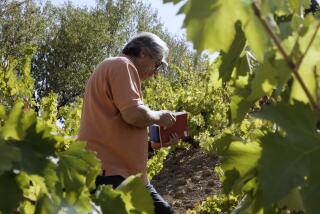COMMENTARY : He Heard It Through the Grapevine
- Share via
In the mid-1920’s, my father, along with his parents and nine other siblings, lived on a rented piece of land in the then spacious town of Alhambra.
Due to that minor law, Prohibition, intoxicating beverages were illegal. However, this statute did little to deter my grandfather, Giuseppe Tortomasi, from producing wine for family and friends. Probably using an old recipe from his native Sicily, Grandpa fermented the stuff in 50-gallon wood barrels.
As my father would relate the story some 50 years later, Grandpa declined to attend a birthday party that was being held for a cousin. Grandma took the kids, which left my grandfather alone when federal agents and the local police came to arrest him for possession of alcohol.
When my grandmother paid a visit to her husband in jail, she found he had two options: pay a $300 fine or stay incarcerated for 100 days. Rather than pay the fine, which was an astronomical sum of money in those days, Grandpa opted for jail time. It should be added here, that, as evidence, the authorities had also confiscated the suspect’s grand collection of barrels of fermenting grape juice.
Later that evening, as my grandfather prepared to spend his first night in the clink, a shot was heard in the police station. The source was not a gun, but rather the cork popping from one of my grandfather’s wine barrels. Apparently, when the cops hauled the evidence over to the police station, they agitated the fermenting brew--an action similar to shaking a sealed can of cola. Of course, this caused the red stuff to spew out of the hole left by the shooting cork. All over the floor it went.
Fearing that this might be the beginning of an atomic-type reaction, various police officers frantically began trying to--pardon the expression--roll out the barrels. They were able to get a few out into the alley. One, however, never did make it out into the night air. That was the one that decided to literally blow its top off. In all, about 100 gallons of wine doused the police station. My grandfather would have many good laughs knowing that he was not the only one who had received justice.
Years later, my father bragged to me that there had been a write-up in the local paper about my grandfather’s bootlegging escapade. In 1982, about three years after my father’s death, I found the microfilmed article at the Alhambra library.
Finding this piece of family treasure was as exciting as invading an attic. It even contained a genealogical surprise. The name Giuseppe Tortomasi, my grandfather’s given name, had been altered in the article. “Giuseppe” had taken on an Anglo transformation: Joe. “Tortomasi” was there, but sans the final “i.”
A typographical error, I thought, but no. When my grandfather first reached Boston Harbor at the turn of the century, an immigration officer mistakenly spelled his name as “Tortomas.” The Neapolitan vowel ending remained missing until the end of World War II. My grandfather then legally changed it back to its original spelling. Yet, despite the misspelling, there was no denying that I’d found what I’d been looking for.
There it was, on the front page of the Alhambra Post-Advocate, dated October 4, 1926. Proudly positioned above an article declaring the horrible news about a Tennessee mine blast that had buried between 32 and 65 miners, read the banner headline:
Alcoholic Flood in City Jail
Officers Get Out Mops
To Stem the Tide
I can almost see them stopping the presses while some defender of the peace mopped up my grandfather’s handiwork.
More to Read
Sign up for Essential California
The most important California stories and recommendations in your inbox every morning.
You may occasionally receive promotional content from the Los Angeles Times.










